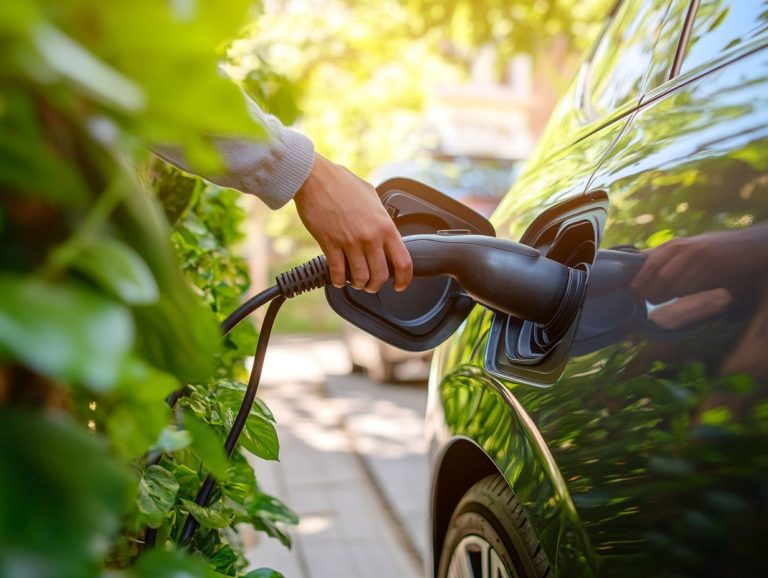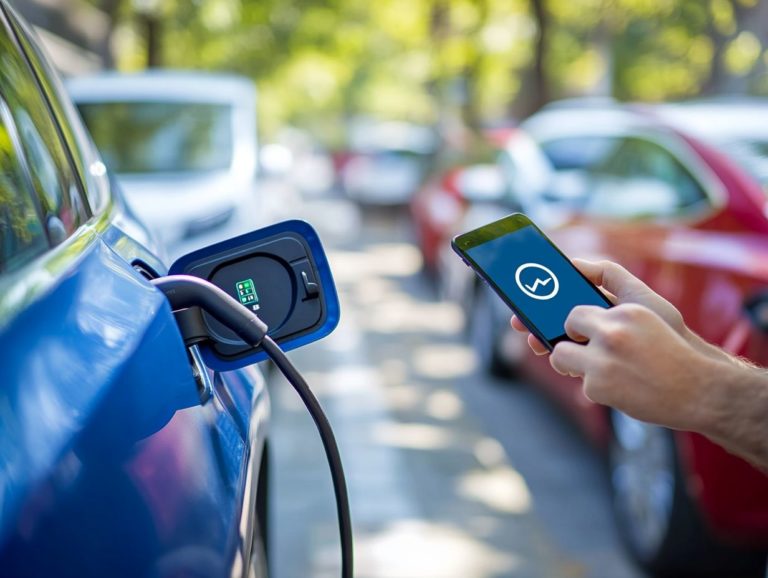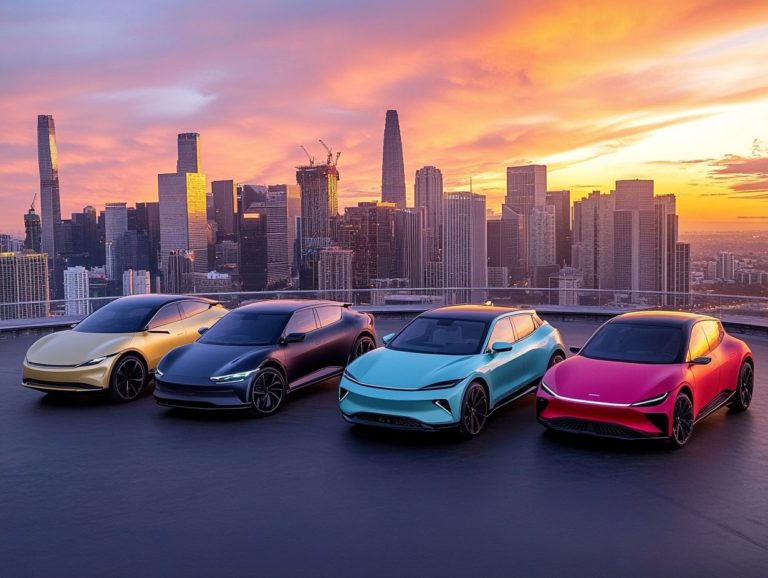what to know before buying an ev charger
As electric vehicles (EVs) continue to rise in popularity, understanding the essentials of EV chargers is vital for you as a potential buyer.
This guide delves into everything from the various types of chargers such as Level 1, Level 2, and DC Fast Chargers to key factors you should consider before making a purchase, including power output, installation costs, and essential features.
Whether you re evaluating your vehicle s requirements or seeking installation advice, this guide will empower you with the knowledge needed to select the perfect EV charger that aligns with your lifestyle.
Contents
- Key Takeaways:
- Types of EV Chargers
- Factors to Consider Before Buying an EV Charger
- Choosing the Right EV Charger for Your Needs
- Installation and Maintenance of EV Chargers
- Frequently Asked Questions
- 1. What factors should I consider before buying an EV charger?
- 2. Do I need a specific type of charger for my electric vehicle?
- 3. How can I determine the charging speed of an EV charger?
- 4. Are there any safety features I should look for in an EV charger?
- 5. Do I need an electrician to install an EV charger?
- 6. Are there any government incentives for purchasing an EV charger?
Key Takeaways:
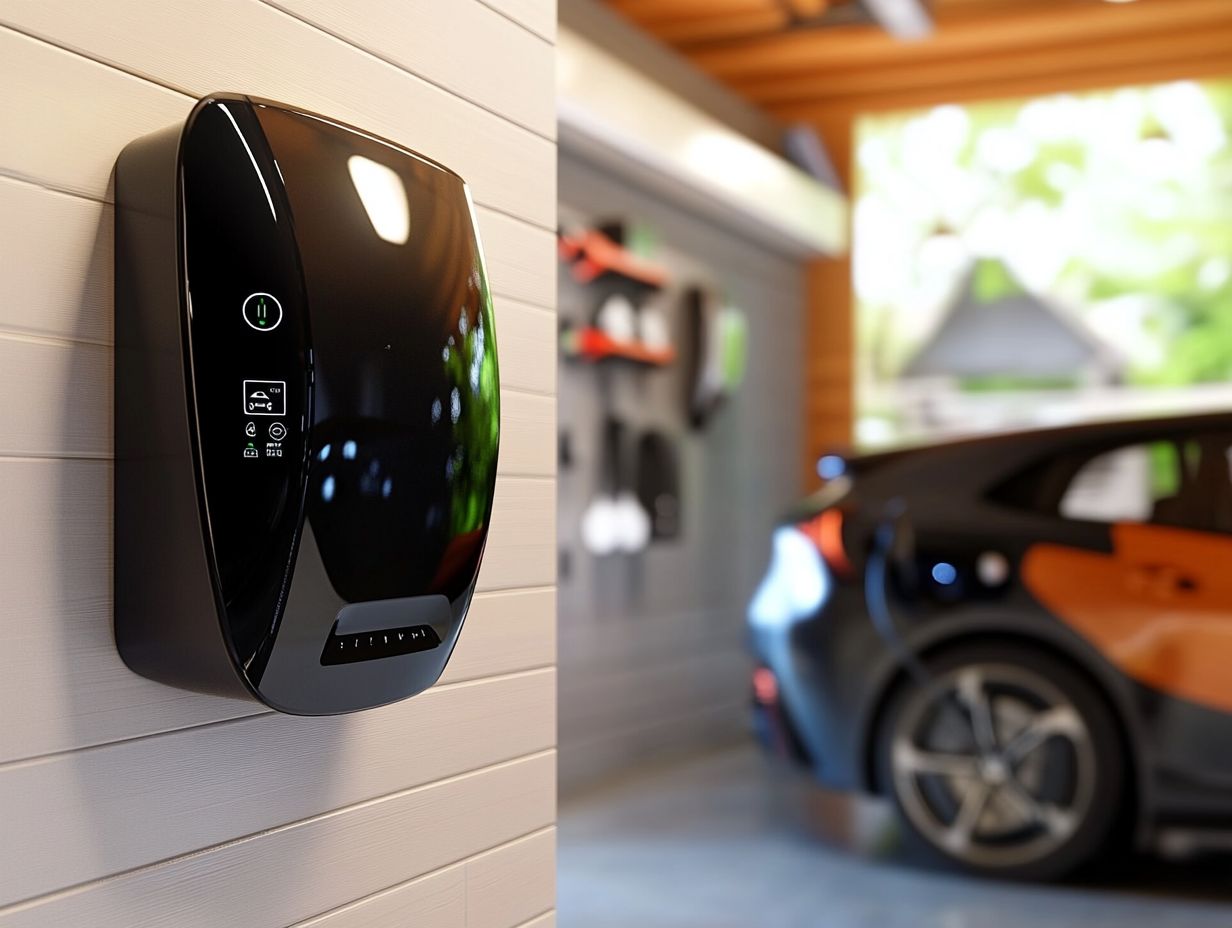
Make sure you consider your power needs and check compatibility before buying an EV charger. Research and compare quickly to find the perfect fit for your vehicle!
Be aware of installation requirements and costs, as well as proper maintenance and troubleshooting tips for your EV charger.
What is an EV Charger?
An EV charger is a specialized device designed to provide electric vehicles (EVs) with the power they need to recharge their batteries. This supports the growing trend of electric mobility.
These chargers include smart features and advanced technology to ensure efficient charging and improve user convenience.
As EV adoption continues to surge, understanding how chargers fit into this system becomes paramount for you as an individual driver and for the broader charging infrastructure.
You’ll find that chargers come in various types, including:
- Level 1
- Level 2
- DC fast chargers
Each boasts unique functionalities tailored to different needs. Smart chargers also provide dynamic load management, helping you save money by managing energy use based on demand.
When weighing the advantages of home charging versus public charging, you ll see that home installations offer convenience and potential savings, while public chargers typically allow for faster recharging capabilities.
Ultimately, enhancing the EV charging experience is crucial not only for drivers like you but also for fostering a sustainable energy ecosystem as a whole.
Types of EV Chargers
When you explore the different types of EV chargers, understanding the nuances between Level 1, Level 2, and DC fast chargers is crucial, as each type caters to specific needs and varying charging speeds.
Level 1 chargers, which plug into a standard household outlet, offer the slowest charging speeds ideal for overnight charging. In contrast, Level 2 chargers significantly enhance charging times and are frequently favored in residential environments.
Meanwhile, DC fast chargers shine in public charging stations, providing swift energy replenishment for those who are always on the move.
Level 1, Level 2, and DC Fast Chargers
Level 1 chargers offer a straightforward charging solution using standard 120V outlets, making them perfect for overnight home charging. On the other hand, Level 2 chargers need a dedicated 240V circuit, significantly speeding up the charging process.
If you’re looking for rapid energy replenishment, DC fast chargers are your go-to. Typically found at public charging stations, they are ideal for those embarking on long-distance journeys in electric vehicles. Understanding these differences in charging capabilities enables you to choose the most fitting solution for your needs.
When weighing the pros and cons of each charging level, it s crucial to assess installation complexity, energy efficiency, and ongoing maintenance costs.
- Level 1 chargers are a breeze to set up; they simply plug into standard wall outlets. However, the slow charging rate might be a setback if you require a quick turnaround.
- Level 2 chargers, while more efficient and faster, do require professional installation, which can lead to higher upfront costs and potential electrical upgrades.
- DC fast chargers may offer the quickest charge for those in a hurry, but be prepared for significant installation expenses and possibly higher utility demand charges.
Each option has its unique benefits, and understanding these factors will empower you to make informed decisions about your charging infrastructure.
Factors to Consider Before Buying an EV Charger
Before you invest in an EV charger, it s essential to consider several key factors. These include power output, installation costs, and how well the charger aligns with your electric vehicle.
Take a moment to assess your energy needs. Factor in your vehicle’s battery capacity and the charging times that fit seamlessly into your lifestyle.
The installation method can significantly influence both convenience and ongoing maintenance expenses. You can choose between a fixed installation directly connected to your home’s wiring or a NEMA plug setup.
Power Output and Compatibility
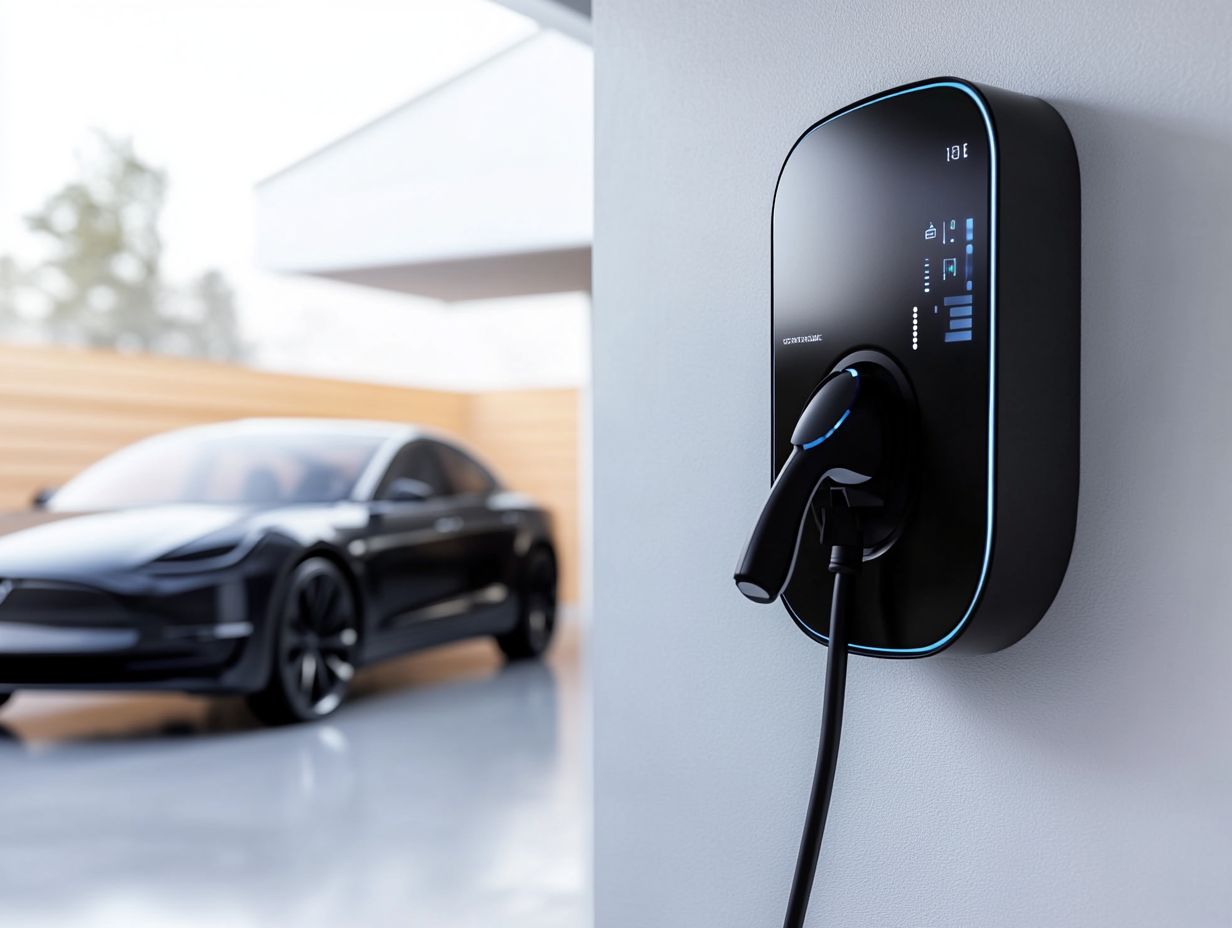
When selecting an EV charger, power output and compatibility are key factors. They determine how efficiently your electric vehicle can be charged and whether the charger will work with your specific model.
Different EVs, like the Nissan Leaf or Tesla Model S, have varying charging rates. It’s essential to evaluate the charger s power requirements alongside your vehicle’s compatibility.
Familiarize yourself with the SAE J1772 North American Charging Standard. This standard outlines specifications for connectors and communication between EVs and chargers, promoting uniformity across different models.
You can confidently use a variety of chargers without running into compatibility issues. There are several types of chargers available:
- Level 1 standard household outlets
- Faster Level 2 units
- DC fast chargers
By understanding these configurations, you can make informed decisions that enhance your driving experience and optimize your charging efficiency.
Installation Requirements and Costs
Understanding the installation requirements and costs associated with EV chargers is crucial for potential buyers. These factors can significantly impact your overall investment in electric vehicle charging infrastructure.
Whether you choose a fixed installation or a NEMA plug setup, costs can fluctuate considerably. Consulting with a local representative can provide valuable insights into the most cost-effective solutions tailored to your home.
It s not just about the initial investment; ongoing preventive maintenance and qualified professionals are vital for peak performance. Approach the installation process with a comprehensive plan.
Assess your home s electrical capacity and determine the optimal placement for the charger. Grasping the long-term benefits of energy efficiency can lead to substantial savings on your utility bills.
Additional Features and Accessories
Many EV chargers come loaded with features designed to elevate your experience. These include:
- Smart capabilities like dynamic load management
- Energy monitoring
- Mobile app connectivity
These enhancements provide insights into your charging sessions while optimizing energy use. You can effortlessly schedule charging times to take advantage of lower electricity rates.
This integration allows for real-time updates and control right from your smartphone. These innovative features enhance convenience and support sustainable energy practices, making EV ownership beneficial for both your wallet and the environment.
Choosing the Right EV Charger for Your Needs
Choosing the right electric vehicle (EV) charger can make your driving experience smoother than ever! This crucial decision requires a thoughtful evaluation of your vehicle’s specific needs and the available charging options to enhance your convenience and efficiency.
Key factors to consider include:
- Assessing your electric vehicle’s charging capacities.
- Determining the optimal location for the charger.
- Deciding whether you favor faster charging speeds or more cost-effective solutions.
Take the time to analyze your needs. You’ll make a choice that fits your lifestyle perfectly.
Assessing Your Vehicle and Charging Needs
Assessing your vehicle and charging needs is a crucial step in finding the most suitable EV charger. Factors like battery capacity and your desired charging time play a significant role in your decision-making process.
As an EV driver, consider your daily travel distance and the average time you have available for charging. Understanding how different charging speeds affect your daily routine is vital.
Evaluating your specific driving patterns whether you frequently embark on long trips or have short commutes can lead you to more tailored charging solutions. Additionally, seasonal changes can impact battery performance and charging efficiency.
Long-term energy management is essential, especially regarding installation methods that minimize downtime while maximizing convenience. This ensures that your charging setup fits well into your lifestyle.
Weigh the benefits of fast-charging options at public stations against home installations to find the perfect balance between accessibility and reliability.
Researching and Comparing Different Chargers
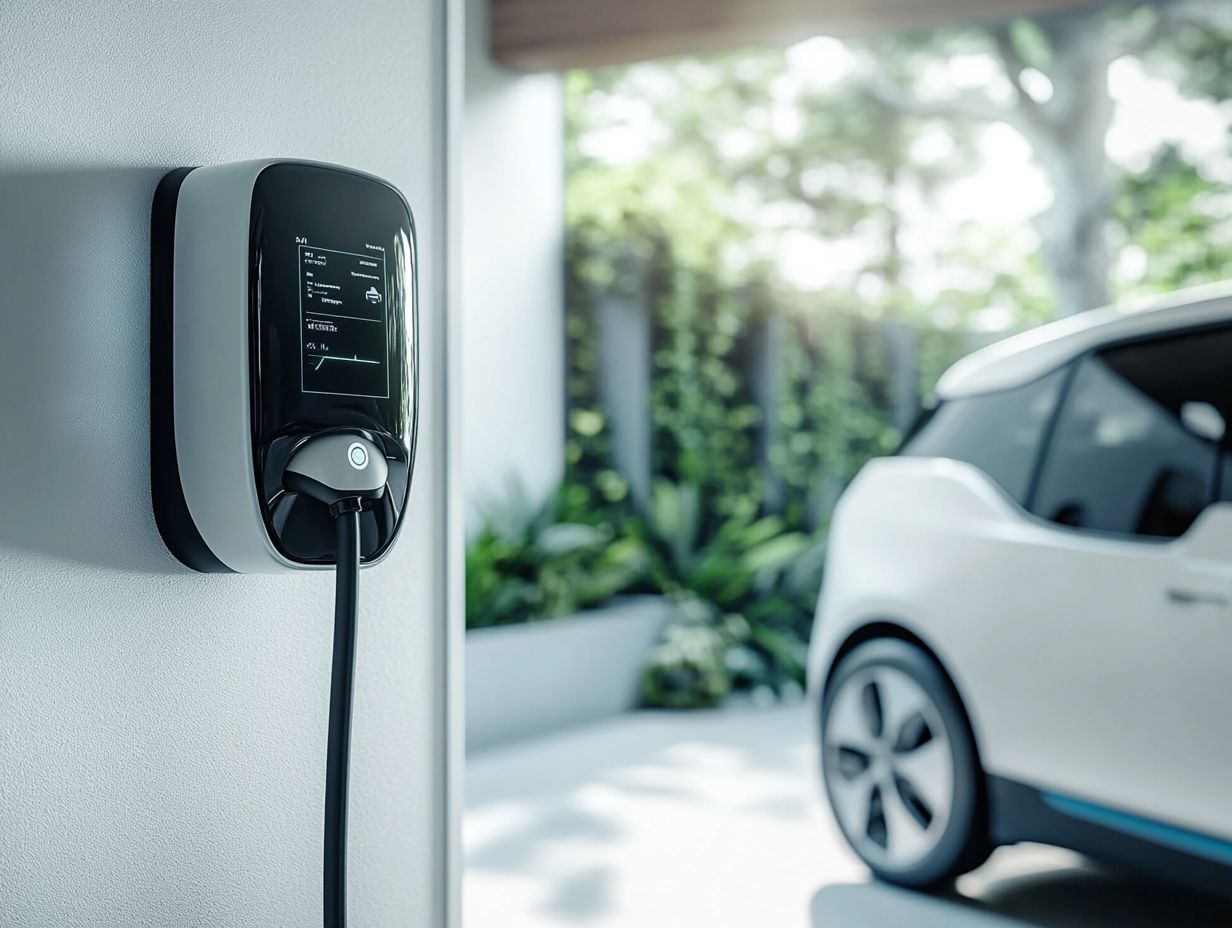
Researching and comparing different EV chargers is essential for making an informed purchase decision. Various options come with distinct features, advantages, and pricing structures.
Consider the application of each charger type whether it’s Level 1, Level 2, or direct current (DC) fast chargers and weigh factors like installation costs, smart features, and warranty offerings to identify a charger that aligns perfectly with your specific needs.
A wealth of resources is at your fingertips. Online reviews provide valuable insights into real-world performance and compatibility with different electric vehicle models.
User testimonials can shed light on personal experiences, especially regarding energy efficiency and ease of use. Meanwhile, expert opinions often dive deeper into technical specifications and long-term reliability.
By synthesizing information from these varied sources, you can better assess which charger meets both your current and future requirements, ultimately leading to a more satisfying purchasing experience.
Installation and Maintenance of EV Chargers
Ensuring the proper installation and maintenance of your EV chargers is crucial for safety, efficiency, and longevity. Overlooking these key aspects can lead to heightened maintenance costs and potential hazards.
By adhering to comprehensive installation guidelines and enlisting professional services, you can guarantee that your EV charger is set up effectively. Additionally, committing to regular preventive maintenance will help ensure its optimal performance over time.
Conclusion
In summary, choosing the right EV charger is vital for enhancing your electric vehicle experience. Take the insights provided and make a decision that meets your needs today!
Proper Installation Guidelines
Proper installation guidelines for EV chargers are vital. They ensure the device operates safely and follows local electrical codes.
You can choose either a hardwired installation or a setup using a standard plug. Following best practices helps you avoid issues with installation.
Engaging a qualified local representative guarantees compliance and enhances overall efficiency. Before starting the installation, assess the electrical capacity of your home or facility carefully.
For hardwired systems, you typically need a dedicated circuit. Standard plug installations require compatible outlets and configurations.
Safety precautions are essential; always turn off the electricity during setup and use appropriate personal protective equipment. Consult licensed electricians to avoid serious safety hazards. Ignoring guidelines can lead to issues like electrical fires or damage to your charger.
This oversight could result in costly repairs and interruptions in your charging availability.
Maintenance and Troubleshooting Tips
Keep your EV charger in top shape! Regular maintenance is crucial for safety and efficiency. By implementing preventive routines such as inspecting cable management and staying updated on charger features you can identify potential issues before they escalate.
Staying proactive with routine checks, like verifying compatibility with the latest EV models, helps you avoid costly repairs and downtime. Being informed about software updates or manufacturer recalls can significantly enhance both safety and performance.
Simple tasks, such as cleaning connectors and monitoring for wear and tear, can help prevent common problems. Understanding the maintenance costs associated with different charger types empowers you to make informed decisions for a reliable charging experience.
Frequently Asked Questions
1. What factors should I consider before buying an EV charger?
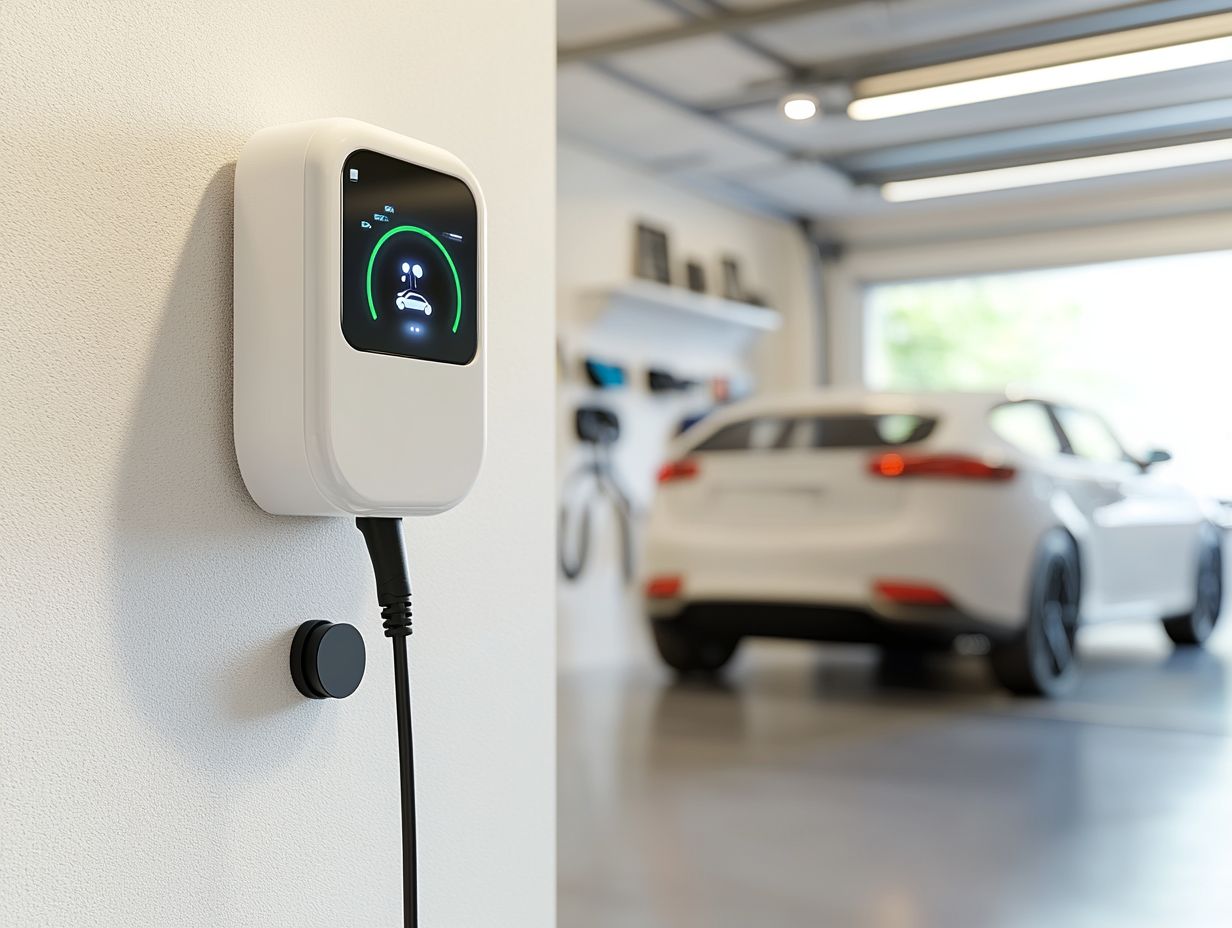
Consider these factors before buying an EV charger: charging speed, compatibility with your vehicle, safety features, warranty, installation, and what to look for in an EV charging plan for smart connectivity options.
2. Do I need a specific type of charger for my electric vehicle?
Yes, it’s important to choose a charger compatible with your specific electric vehicle model. Different electric vehicles require different charging speeds and connector types, so check the specifications before purchasing.
3. How can I determine the charging speed of an EV charger?
The charging speed of an EV charger is measured in kilowatts (kW). Generally, the higher the kW, the faster the charging time. However, the actual charging speed also depends on the capacity of your vehicle’s battery.
4. Are there any safety features I should look for in an EV charger?
Yes, safety should be a top priority when choosing an EV charger. Look for features such as ground fault protection, overcurrent protection, and surge protection. It’s also important to purchase from a reputable and certified manufacturer.
5. Do I need an electrician to install an EV charger?
In most cases, yes. Having a professional electrician install your EV charger ensures it’s done safely and correctly. This may also be required for warranty purposes.
6. Are there any government incentives for purchasing an EV charger?
Yes, some governments offer incentives or rebates for installing an EV charger at home. These incentives vary by location, so check with your local government or utility company to see if you are eligible.




